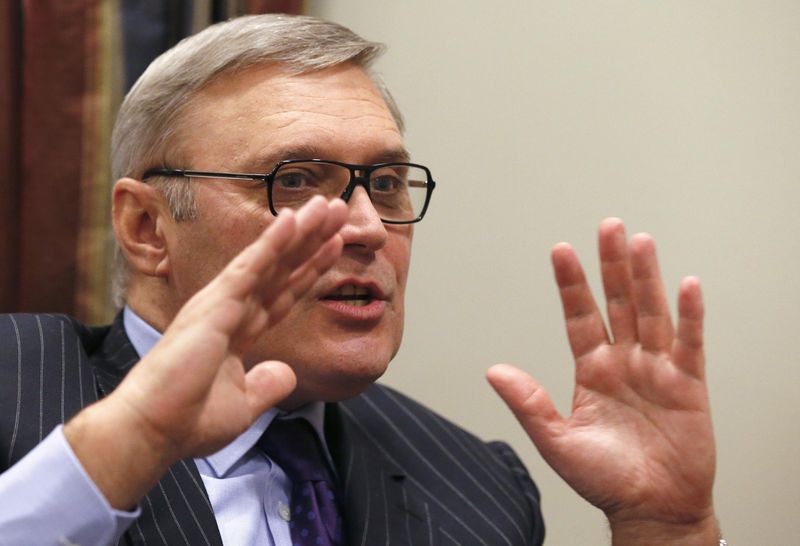By Timothy Heritage and Alexei Anishchuk
MOSCOW (Reuters) - President Vladimir Putin assured Russians on Thursday that the economy would rebound after the ruble's dramatic slide this year but offered no remedy for a deepening financial crisis.
In an assured performance at a three-hour news conference, Putin blamed the economic problems on external factors and said the crisis over Ukraine was caused by the West, which he accused of building a "virtual" Berlin Wall to contain Russia.
Putin even cracked jokes at times, despite pressure to fix an economy that is heading into recession and caught by what his economy minister called a "perfect storm" of low oil prices, Western sanctions over Ukraine and global economic problems.
The rouble has fallen about 45 percent against the dollar this year, and suffered particularly steep falls on Monday and Tuesday, but Putin said its eventual rise was unavoidable and avoided using the word "crisis".
"If the situation develops unfavorably, we will have to amend our plans. Beyond doubt, we will have to cut some (spending). But a positive turn and emergence from the current situation are inevitable," Putin said.
"The growth of the global economy will continue and our economy will rebound from the current situation," he said, sitting at a large desk before a studio audience, with his comments broadcast live to the nation.
Putin, 62, looked confident in front of screens showing larger-than-life close-ups of his face as he took questions, though at three hours and nine minutes the news conference was shorter than in previous years. On his desk was a white mug with a presidential crest that he occasionally sipped from.
The former KGB spy said Russia must diversify its economy to reduce dependence on oil, its major export and a key source of state income. The recovery could start in 2015, he said, though economic problems might last another two years.
But he stuck to broad promises rather than going into details and announced no major new proposals. He has said many times during 15 years in power that he will reduce Russia's reliance on energy exports but has failed to do so.
The rouble slipped as he spoke, and was about 1.5 percent weaker on the day. The central bank increased its key lending rate by 6.5 percentage points to 17 percent on Tuesday, and has spent more than $80 billion trying to shore up the rouble this year, but to little avail.
HEADS TO ROLL?
Although Putin said the central bank and government had acted "adequately", he chided the bank for not halting foreign exchange interventions sooner, suggesting more decisive action might have made this week's big interest rate rise unnecessary.
"All this implies pretty big divisions within the administration as to how to react to the crisis and pressure on the rouble," Timothy Ash, head of emerging market research at Standard Bank in London, said in a note, adding that heads could roll.
Neil Shearing, chief emerging markets economist at Capital Economics in London, said Putin had signaled no change of government policy.
"Capital controls remain a measure of last resort, and the first line of defense for the rouble will be continued tight monetary policy. Whatever happens, a deep recession now looms," he said.
Opinion polls show Putin has had high popularity ratings since annexing the Crimea peninsula from Ukraine in March, but the ruble's decline could erode faith in his ability to provide financial stability -- an important source of his support.
A prominent opponent, former Prime Minister Mikhail Kasyanov, said Putin's problems would increase as prices are expected to surge next year because of the ruble's weakness and the president should realize "he needs an exit strategy" to leave power.
Despite this, Putin said he felt the "support of the Russian people", though he had not decided yet whether to seek a new six-year term in an election due in 2018 that could extend his rule to almost a quarter of a century.
Asked about Ukraine, where Russia has irked the West by backing pro-Russian separatists fighting in two eastern regions, Putin said the West was to blame for the months-long crisis.
He said Moscow wanted a political resolution to a conflict that has killed 4,700 people and called for "political unity" -- suggesting he does not intend to annex the Russian-speaking regions that have rebelled. He avoided describing those areas as "New Russia", a phrase he has used in the past.
But he blamed NATO for the worst relations between Moscow and the West in decades.
"Didn't they tell us after the collapse of the Berlin Wall that NATO would not expand eastwards? But it happened immediately. Two waves of expansion. Is that not a wall? ... It's a virtual wall," he said.

(Additional reporting by Moscow newsroom; Editing by Elizabeth Piper, Janet McBride and Giles Elgood)